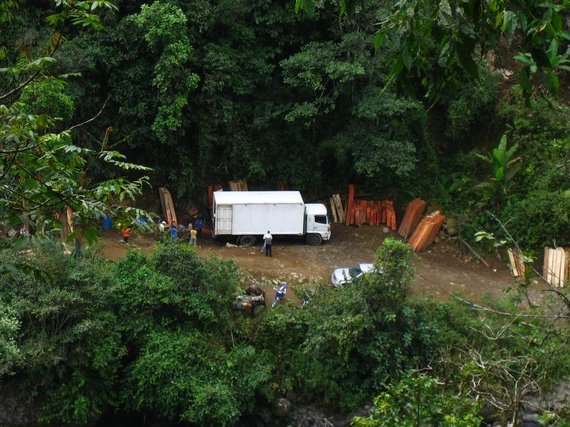Illegal logging in Ecuador
Imagine walking down the supermarket aisle and plucking tropical trees from the shelves. Next to the milk, you throw in an ungurahui tree from the Amazon. Atop the cereal, a durian tree from Indonesia. At the checkout, the cashier looks unfazed, and asks if you want paper or plastic.
This scenario is far-fetched ... sort of. Though we're usually several degrees and thousands of miles removed from the direct consequences of our purchases, many of the products in our refrigerators and medicine cabinets do contain remnants of faraway forests.
Nearly three-quarters of tropical deforestation has been driven by commercial agriculture to make way for the commodities that become key ingredients to countless food items and products, from hamburgers to soap to toothpaste, according to a recent Forest Trends report. Palm oil, from Southeast Asia and--increasingly--Africa, is present in half of all supermarket products, and goes by a dozen different ingredient names. Vegetarians are often surprised to know that soy comes at the expense of millions of hectares of forests in Latin America.
And at least half of all deforestation in the tropics is illegal: A rubber company in Cambodia operating a plantation within a national park. Palm oil tycoons in Indonesia bribing government officials. Cattle ranchers in Brazil fudging land titles. A biofuel company in Tanzania intimidating villagers into signing away their land. And it's happening quickly: Every minute, five football fields of forests are cleared illegally.
These supply chains are so long and complex that consumers are usually oblivious to the shady business that goes into making the products we consume every day.
Campaigns by watchdog environmental and human rights groups have begun to shine light on the problem. In 2010, Greenpeace demonstrators showed up at Nestlé headquarters in orangutan suits and released a clever campaign video about Kit Kats and deforestation. When the company's share price dipped, Nestlé stopped contracting with Golden Agri-Resources, the palm oil company that was then known for flattening orangutan habitat.
When Oxfam revealed that Coca-Cola's sugar purchasing was driving massive land conflicts at the expense of small farmers and indigenous communities, the company announced a zero-tolerance policy for suppliers grabbing land. In other words, as consumers take notice, the companies that source agricultural commodities pay attention, too.
It took time and a few more campaigns, but eventually this attention turned into formal pledges from companies that realize that their deforestation was not only irresponsible, but also bad for business. Within the last year, the world's three largest palm oil suppliers--Wilmar, Golden Agri-Resources, and Cargill--all made commitments to purge deforestation from their supply chains. The pledges cover 60% of the global palm oil market, which translates into $30 billion in annual sales.
Since these big suppliers took the plunge, new "no deforestation" commitments have been coming out almost weekly from companies such as Krispy Kreme, Johnson & Johnson, Pepsi, Cargill, and many others. Slowly, the beef and soy industries are also beginning to think about how to create their products without driving deforestation. These are positive commitments, and the world is watching to see how they will be turned into actions.
Their efforts will have huge implications for life on this planet. Illegal forest conversion for mega-crops releases nearly 1.5 gigatonnes of carbon dioxide into the atmosphere annually. If the international trade in agricultural commodities were a country, it would be the sixth largest contributor to climate change in the world. As the global population swells to 9 billion--and as about 3 billion more people enter the middle class--the commercial demand for these products would, under the business-as-usual scenario, drive even more emissions.
So how do we get to business unusual? It will take some collaboration. Forested countries that produce these commodities will need to make sure they have consistent, enforceable laws on legal and illegal deforestation. Countries that import palm oil, soy, and beef will need to send a strong signal that they will not purchase agricultural goods grown on illegally cleared land by passing clear and enforceable regulations, taking a cue from successful efforts to stop importing illegal timber. The private sector will need to "race to the top" by setting higher industry standards for responsible business, and pulling out of illegal projects.
If done right, this business unusual could include rather than exploit the people who live in and care for tropical forests. It could transform degraded landscapes into farms and plantations while keeping the world's remaining rainforests intact. It could grow local economies without exacerbating climate change.
Consumers will need to be part of this transformation, too, by demanding products that keep tropical trees out of their shopping carts. We can no longer be duped into buying products that drive forest destruction at the expense of our climate and millions of people in the developing world. But this effort should begin way before those products reach supermarket shelves.
This report was filed by Allie Goldstein.

